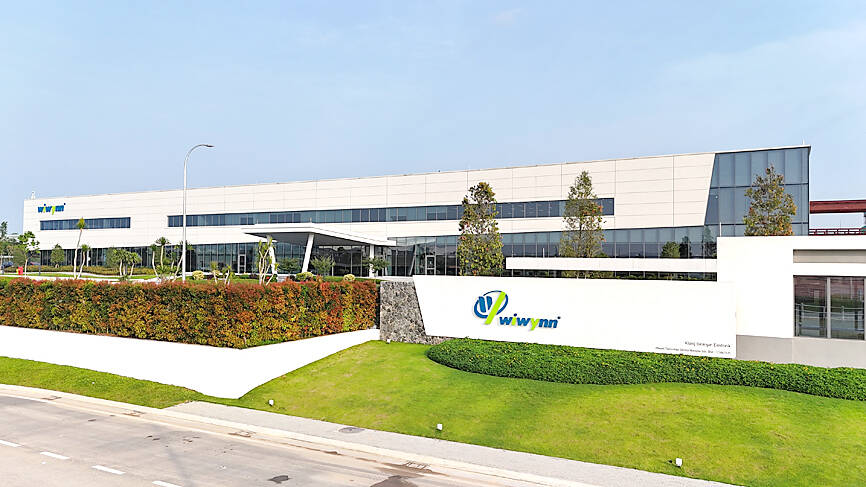Wiwynn Corp (緯穎科技) is to continue capacity expansion to meet market demand, the maker of cloud-based servers and hyperscale data centers said yesterday, adding that the growth momentum of artificial intelligence (AI) servers would remain strong next year.
The company’s non-current assets including factories account for 10 percent of total assets, indicating that Wiwynn has actively and continuously expanded its production capacity in recent years, chief financial officer Harry Chen (陳昌偉) told investors yesterday.
Chen said the company’s board of directors on Monday approved a plan to lease land on the Tainan campus of the Southern Taiwan Science Park and build a new factory there to produce server circuit boards and for testing and certifying new products including AI servers and cloud-based devices.

Photo courtesy of Wiwynn Corp
The construction cost is estimated at about NT$6.2 billion (US$192.6 million), he said.
The new investment comes as the company installed more production equipment at its existing factory in Tainan this month as market demand continues to rise, Wiwynn said.
The company started construction of its first factory in Malaysia in the third quarter of this year, mainly for systems integration services, it said. The second factory in Malaysia, primarily for the production of motherboards, is expected to begin production in the second half of next year, it added.
The company also plans to expand capacity at its factories in Mexico to enhance supply chain resilience, it said.
Wiwynn reported a net profit of NT$2.62 billion (US$81.4 million) in the July-to-September quarter, flat from the previous quarter but down 39.4 percent from NT$4.32 billion a year earlier, with earnings per share of NT$14.96.
Gross margin improved to 9.6 percent in the third quarter, compared with 8.8 percent in the previous quarter and 8.1 percent a year ago. Last quarter’s gross margin was the company’s best quarterly figure since its Taiwan Stock Exchange debut in late March 2019.
During the first three quarters of this year, net profit contracted 16.6 percent to NT$8.53 billion, from NT$10.22 billion a year ago, with earnings per share dropping to NT$48.78 from NT$58.48.
Third-quarter revenue dropped 33.7 percent year-on-year to NT$52.82 billion and cumulative revenue in the first three quarters fell 10.8 percent annually to NT$183.35 billion.
Chen said the annual decrease in revenue in the third quarter was not unexpected, but added that AI server revenue exceeded 10 percent of its total revenue in the quarter, meeting the company’s expectations.

SELL-OFF: Investors expect tariff-driven volatility as the local boarse reopens today, while analysts say government support and solid fundamentals would steady sentiment Local investors are bracing for a sharp market downturn today as the nation’s financial markets resume trading following a two-day closure for national holidays before the weekend, with sentiment rattled by US President Donald Trump’s sweeping tariff announcement. Trump’s unveiling of new “reciprocal tariffs” on Wednesday triggered a sell-off in global markets, with the FTSE Taiwan Index Futures — a benchmark for Taiwanese equities traded in Singapore — tumbling 9.2 percent over the past two sessions. Meanwhile, the American depositary receipts (ADRs) of Taiwan Semiconductor Manufacturing Co (TSMC, 台積電), the most heavily weighted stock on the TAIEX, plunged 13.8 percent in

A wave of stop-loss selling and panic selling hit Taiwan's stock market at its opening today, with the weighted index plunging 2,086 points — a drop of more than 9.7 percent — marking the largest intraday point and percentage loss on record. The index bottomed out at 19,212.02, while futures were locked limit-down, with more than 1,000 stocks hitting their daily drop limit. Three heavyweight stocks — Taiwan Semiconductor Manufacturing Co (TSMC, 台積電), Hon Hai Precision Industry Co (Foxconn, 鴻海精密) and MediaTek (聯發科) — hit their limit-down prices as soon as the market opened, falling to NT$848 (US$25.54), NT$138.5 and NT$1,295 respectively. TSMC's

TARIFFS: The global ‘panic atmosphere remains strong,’ and foreign investors have continued to sell their holdings since the start of the year, the Ministry of Finance said The government yesterday authorized the activation of its NT$500 billion (US$15.15 billion) National Stabilization Fund (NSF) to prop up the local stock market after two days of sharp falls in reaction to US President Donald Trump’s new import tariffs. The Ministry of Finance said in a statement after the market close that the steering committee of the fund had been given the go-ahead to intervene in the market to bolster Taiwanese shares in a time of crisis. The fund has been authorized to use its assets “to carry out market stabilization tasks as appropriate to maintain the stability of Taiwan’s

STEEP DECLINE: Yesterday’s drop was the third-steepest in its history, the steepest being Monday’s drop in the wake of the tariff announcement on Wednesday last week Taiwanese stocks continued their heavy sell-off yesterday, as concerns over US tariffs and unwinding of leveraged bets weighed on the market. The benchmark TAIEX plunged 1,068.19 points, or 5.79 percent, to 17,391.76, notching the biggest drop among Asian peers as it hit a 15-month low. The decline came even after the government on late Tuesday authorized the NT$500 billion (US$15.2 billion) National Stabilization Fund (國安基金) to step in to buoy the market amid investors’ worries over tariffs imposed by US President Donald Trump. Yesterday’s decline was the third-steepest in its history, trailing only the declines of 2,065.87 points on Monday and